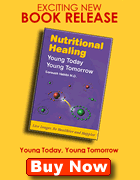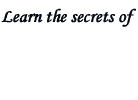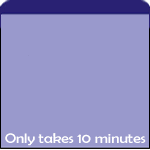 |
Thyroxine
Thyroxine (T4) is a vital hormone secreted by the thyroid gland located in
front of the neck, and it regulates the Basal Metabolic Rate (BMR). The active
form of thyroxine is called triiodothyronine (T3), which is made from thyroxine
in the liver and kidneys. For this conversion of T4 to T3 one needs selenium,
zinc and amino acid cysteine. However, to remove any confusion we will discuss
thyroxine as the main thyroid hormone. Thyroxine is made from amino acid tyrosine
and iodine in the thyroid gland. However, vitamins A, B group especially B2,
B6, B12, vitamins C and E play an important role in this production. Without
your thyroxine you would be feeling cold, lethargic, unmotivated, lazy and basically
miserable. You would be overweight, have rough and dry skin, be constipated,
have irregular periods, low libido, and be depressed. Thyroxine gives you vitality
and energy. It aids the protein synthesis, which is necessary for enzyme production
and hence affecting many functions in the body. Thyroid hormone is vital in
bone growth, heart function, development of the nervous system, enhancement
of immune system, lipid metabolism, prevention of osteoporosis, and the rate
of absorption of nutrients via gastrointestinal tract. Without thyroxine one
would age much faster.
In any anti-aging program the thyroid function tests including TSH (Thyroid
Stimulating Hormone), T4, T3 and RT3 (Reversed T3) should be measured and treated
in case of deficiency. Stress should be dealt with as it produces cortisol which
blocks T4 to T3 conversion.
|
 |
Reversed T3 syndrome
When RT3 is above the normal range it produces some features of hypothyroidism.
These include lethargy, slow heart beat, low body temperature, feeling cold,
horse voice, coarse skin, slow speech, slow thinking, obesity and constipation.
Increased RT3 inhibits the action of T3.
Stress, high cortisol level, fasting, illness and low zinc and selenium levels
cause Reversed T3 syndrome as they block conversion of T4 to T3.
To treat this condition one needs to treat the underlying cause, supplement
with zinc and selenium in deficient patients and bring T3 into balance.
For more detailed information and specific recommendations, please [click here] to become a member of DrHabibi.com
|
 |




